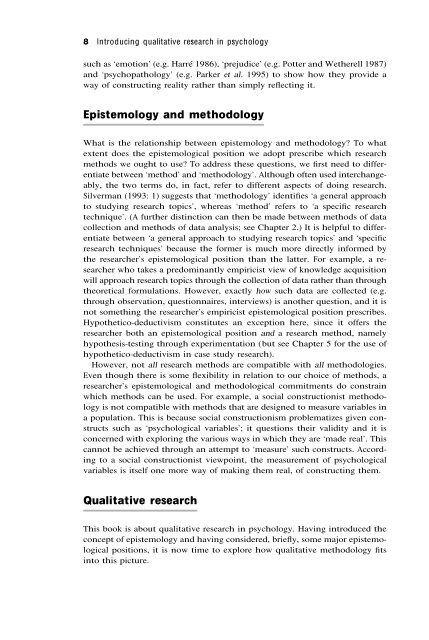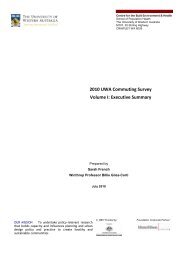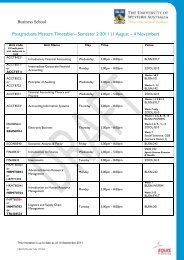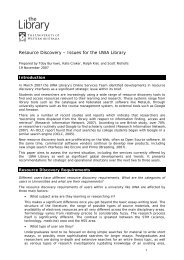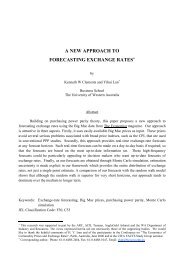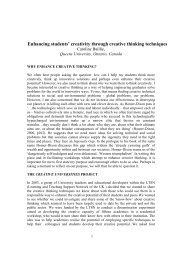Adventures in theory and method
Adventures in theory and method
Adventures in theory and method
Create successful ePaper yourself
Turn your PDF publications into a flip-book with our unique Google optimized e-Paper software.
8 Introduc<strong>in</strong>g qualitative research <strong>in</strong> psychologysuch as ‘emotion’ (e.g. Harré 1986), ‘prejudice’ (e.g. Potter <strong>and</strong> Wetherell 1987)<strong>and</strong> ‘psychopathology’ (e.g. Parker et al. 1995) to show how they provide away of construct<strong>in</strong>g reality rather than simply reflect<strong>in</strong>g it.Epistemology <strong>and</strong> <strong>method</strong>ologyWhat is the relationship between epistemology <strong>and</strong> <strong>method</strong>ology? To whatextent does the epistemological position we adopt prescribe which research<strong>method</strong>s we ought to use? To address these questions, we first need to differentiatebetween ‘<strong>method</strong>’ <strong>and</strong> ‘<strong>method</strong>ology’. Although often used <strong>in</strong>terchangeably,the two terms do, <strong>in</strong> fact, refer to different aspects of do<strong>in</strong>g research.Silverman (1993: 1) suggests that ‘<strong>method</strong>ology’ identifies ‘a general approachto study<strong>in</strong>g research topics’, whereas ‘<strong>method</strong>’ refers to ‘a specific researchtechnique’. (A further dist<strong>in</strong>ction can then be made between <strong>method</strong>s of datacollection <strong>and</strong> <strong>method</strong>s of data analysis; see Chapter 2.) It is helpful to differentiatebetween ‘a general approach to study<strong>in</strong>g research topics’ <strong>and</strong> ‘specificresearch techniques’ because the former is much more directly <strong>in</strong>formed bythe researcher’s epistemological position than the latter. For example, a researcherwho takes a predom<strong>in</strong>antly empiricist view of knowledge acquisitionwill approach research topics through the collection of data rather than throughtheoretical formulations. However, exactly how such data are collected (e.g.through observation, questionnaires, <strong>in</strong>terviews) is another question, <strong>and</strong> it isnot someth<strong>in</strong>g the researcher’s empiricist epistemological position prescribes.Hypothetico-deductivism constitutes an exception here, s<strong>in</strong>ce it offers theresearcher both an epistemological position <strong>and</strong> a research <strong>method</strong>, namelyhypothesis-test<strong>in</strong>g through experimentation (but see Chapter 5 for the use ofhypothetico-deductivism <strong>in</strong> case study research).However, not all research <strong>method</strong>s are compatible with all <strong>method</strong>ologies.Even though there is some flexibility <strong>in</strong> relation to our choice of <strong>method</strong>s, aresearcher’s epistemological <strong>and</strong> <strong>method</strong>ological commitments do constra<strong>in</strong>which <strong>method</strong>s can be used. For example, a social constructionist <strong>method</strong>ologyis not compatible with <strong>method</strong>s that are designed to measure variables <strong>in</strong>a population. This is because social constructionism problematizes given constructssuch as ‘psychological variables’; it questions their validity <strong>and</strong> it isconcerned with explor<strong>in</strong>g the various ways <strong>in</strong> which they are ‘made real’. Thiscannot be achieved through an attempt to ‘measure’ such constructs. Accord<strong>in</strong>gto a social constructionist viewpo<strong>in</strong>t, the measurement of psychologicalvariables is itself one more way of mak<strong>in</strong>g them real, of construct<strong>in</strong>g them.Qualitative researchThis book is about qualitative research <strong>in</strong> psychology. Hav<strong>in</strong>g <strong>in</strong>troduced theconcept of epistemology <strong>and</strong> hav<strong>in</strong>g considered, briefly, some major epistemologicalpositions, it is now time to explore how qualitative <strong>method</strong>ology fits<strong>in</strong>to this picture.


